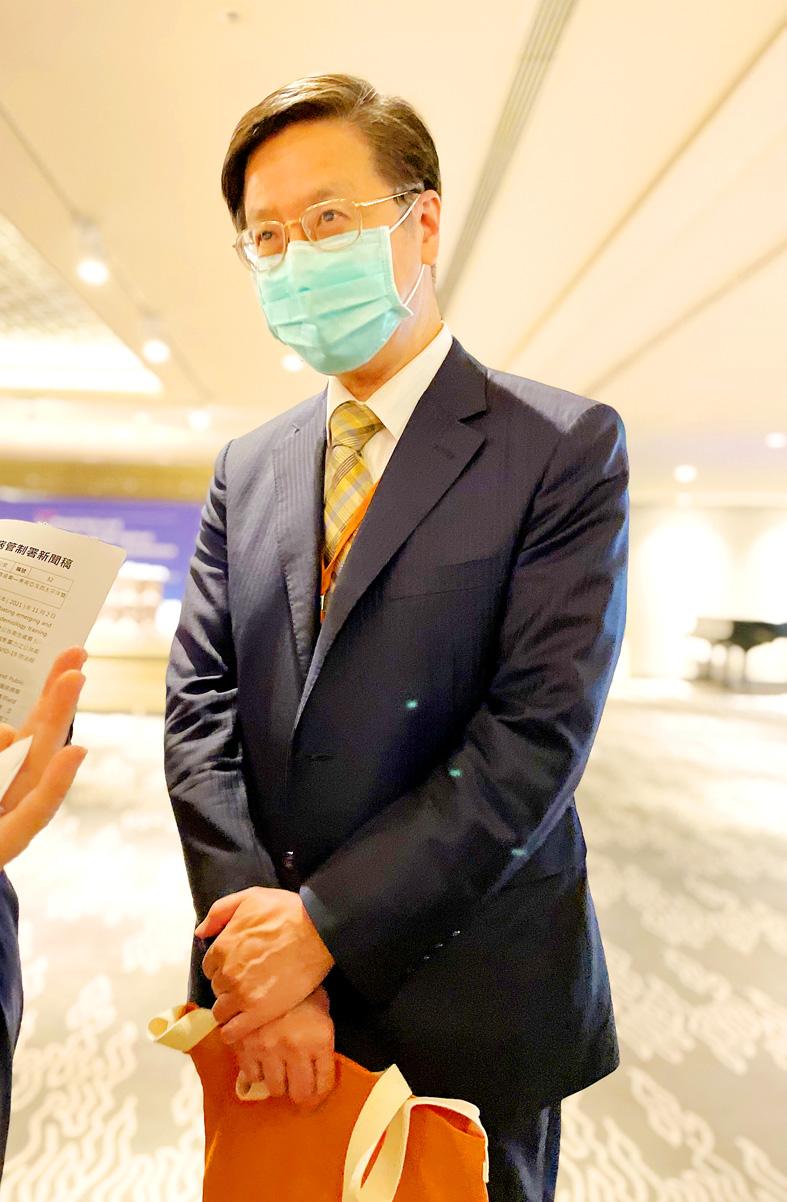Preliminary findings from a “mix-and-match” clinical trial of COVID-19 vaccines showed that people who received a first dose of the AstraZeneca vaccine and a second dose of the Moderna vaccine have higher antibody levels than those who received two doses of the AstraZeneca vaccine, Central Epidemic Command Center (CECC) specialist advisory panel convener Chang Shan-chwen (張上淳) said yesterday.
The clinical trial conducted by National Taiwan University (NTU) Hospital recruited 400 participants, who were divided into four groups of 100 people each, Chang, an NTU executive vice president, told reporters on the sidelines of the 10th TEPHINET Southeast Asia/Western Pacific Bi-Regional Scientific Conference in Taipei.
The first group was given two doses of the AstraZeneca vaccine, eight weeks apart; the second group had two doses of the Moderna vaccine, four weeks apart; while the remaining two were given one dose of the AstraZeneca vaccine, followed by a dose of the Moderna vaccine, four weeks and eight weeks apart, Chang said.

Photo: CNA
Antibody tests conducted on the 14th day and the 28th day after the participants received a second dose have been completed, but a third test to be conducted three months after their second dose has yet to be done, he said.
Based on the first two antibody tests, people who received the AstraZeneca-Moderna combination have higher neutralizing antibody titers (levels) than those who received two doses of the AstraZeneca vaccine, but they are about the same as those who received two doses of Moderna, Chang said.
There were also more people in the AstraZeneca-Moderna combination groups who reported post-vaccination side effects than people in the groups who received two doses of the same vaccine, he said.
While a higher percentage of people who received the AstraZeneca-Moderna combination experienced side effects, the severity of the side effects was about the same, he added.
Moreover, when comparing the two AstraZeneca-Moderna combination groups, people who received the two doses eight weeks apart had slightly higher antibody levels than those who received them four weeks apart, so extending the interval a little longer should be acceptable, he said.
At the CECC’s daily news briefing yesterday, Centers for Disease Control Deputy Director-General Chuang Jen-hsiang (莊人祥) said the center is considering allowing the public to receive a mix of the AstraZeneca and Moderna vaccines from later this month.
At present, only medical workers have the option of choosing Moderna for their second shot after receiving an AstraZeneca jab at least 10 weeks earlier.
The CECC late last month said that it would this month offer the public the option to receive the AstraZeneca vaccine as their first dose and the Pfizer-BioNTech vaccine as the second.
Additional reporting by CNA

MORE VISITORS: The Tourism Administration said that it is seeing positive prospects in its efforts to expand the tourism market in North America and Europe Taiwan has been ranked as the cheapest place in the world to travel to this year, based on a list recommended by NerdWallet. The San Francisco-based personal finance company said that Taiwan topped the list of 16 nations it chose for budget travelers because US tourists do not need visas and travelers can easily have a good meal for less than US$10. A bus ride in Taipei costs just under US$0.50, while subway rides start at US$0.60, the firm said, adding that public transportation in Taiwan is easy to navigate. The firm also called Taiwan a “food lover’s paradise,” citing inexpensive breakfast stalls

TRADE: A mandatory declaration of origin for manufactured goods bound for the US is to take effect on May 7 to block China from exploiting Taiwan’s trade channels All products manufactured in Taiwan and exported to the US must include a signed declaration of origin starting on May 7, the Bureau of Foreign Trade announced yesterday. US President Donald Trump on April 2 imposed a 32 percent tariff on imports from Taiwan, but one week later announced a 90-day pause on its implementation. However, a universal 10 percent tariff was immediately applied to most imports from around the world. On April 12, the Trump administration further exempted computers, smartphones and semiconductors from the new tariffs. In response, President William Lai’s (賴清德) administration has introduced a series of countermeasures to support affected

CROSS-STRAIT: The vast majority of Taiwanese support maintaining the ‘status quo,’ while concern is rising about Beijing’s influence operations More than eight out of 10 Taiwanese reject Beijing’s “one country, two systems” framework for cross-strait relations, according to a survey released by the Mainland Affairs Council (MAC) on Thursday. The MAC’s latest quarterly survey found that 84.4 percent of respondents opposed Beijing’s “one country, two systems” formula for handling cross-strait relations — a figure consistent with past polling. Over the past three years, opposition to the framework has remained high, ranging from a low of 83.6 percent in April 2023 to a peak of 89.6 percent in April last year. In the most recent poll, 82.5 percent also rejected China’s

PLUGGING HOLES: The amendments would bring the legislation in line with systems found in other countries such as Japan and the US, Legislator Chen Kuan-ting said Democratic Progressive Party (DPP) Legislator Chen Kuan-ting (陳冠廷) has proposed amending national security legislation amid a spate of espionage cases. Potential gaps in security vetting procedures for personnel with access to sensitive information prompted him to propose the amendments, which would introduce changes to Article 14 of the Classified National Security Information Protection Act (國家機密保護法), Chen said yesterday. The proposal, which aims to enhance interagency vetting procedures and reduce the risk of classified information leaks, would establish a comprehensive security clearance system in Taiwan, he said. The amendment would require character and loyalty checks for civil servants and intelligence personnel prior to